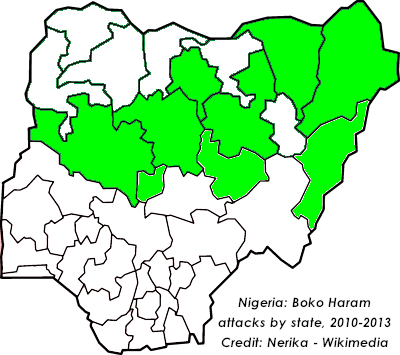A year ago, the world was focused on a young Nigerian man who had packed explosives into his underwear and tried to blow up a transatlantic flight over Michigan on Christmas Day. But as he was not trained in Nigeria (in fact, Yemen, which is much more commonly associated with terrorist threats), and as he was not “typical” of those considered at risk for falling in with terrorists (he was nicknamed the “Trust-Fund Terrorist”) the world’s eye soon turned away from Nigeria as a big terrorism risk. At present, though he may have been an unrelated outlier, this response is starting look have looked premature unfortunately…
October 1, twin car bombs go off in the midst of a re-election rally for President Jonathan:
All that was left of two cars packed with explosives was their smouldering chassis after they had been blown up on October 1st near Eagle Square in Abuja, Nigeria’s capital, while surrounded by unsuspecting citizens celebrating the 50th anniversary of their country’s independence. At least 12 people died and dozens were injured in this year’s most worrying act of political violence. A well-known rebel group, the Movement for the Emancipation of the Niger Delta (MEND), which is most active in the oil-producing south, claimed responsibility but blamed the government for the deaths, insisting that it had ignored back-channel warnings given 24 hours before the blasts.
The attacks took place close to President Goodluck Jonathan, as he was reviewing a parade a few hundred yards away in front of invited dignitaries. Shortly before the bombings he had declared: “There is certainly much to celebrate: our freedom, our strength, our unity and our resilience.”
[…]
The attack in Abuja is unlikely to be the last act of political violence in Nigeria before the poll. The country’s police say they foiled a similar attack in September.
Christmas Eve bombings spark riots:
Clashes broke out between armed Christian and Muslim groups near the central Nigerian city of Jos on Sunday, a Reuters witness said, after Christmas Eve bombings in the region killed more than 30 people.
Buildings were set ablaze and people were seen running for cover as the police and military arrived on the scene in an effort to disperse crowds. Injured people covered in blood were being dragged by friends and family to hospital.
The unrest was triggered by explosions on Christmas Eve in villages near Jos, capital of Plateau state, that killed at least 32 people and left 74 critically injured.
December 29, Islamist group explodes two bombs in the Delta Region at a political rally:
Bombs hit a political rally in a southern Nigerian city on Wednesday, a day after three people were shot and killed in the north of the country, as tensions rose before a series of elections next year. The two bombs exploded in the Niger Delta, the heartland of Africa’s largest oil and gas industry, and the police said they caused injuries but no deaths. Boko Haram, a radical Islamist group, was believed to be behind the killing of the three people on Tuesday, the police said. The victims, including a senior police officer, were killed when men fired shots in a teaching hospital in the northeastern city of Maiduguri, the capital of Borno State.
There are two relatively distinct political problems in Nigeria that could involve terrorism: a north/south geopolitical and cultural divide and the ongoing Niger Delta conflict. While the problem of internecine violence between those identifying with the country’s north and those identifying with the south has been a lengthy one, there is some question as to whether it is taking on a more terroristic edge.
Read more



